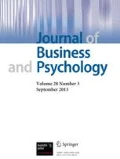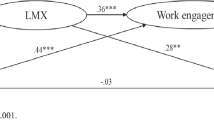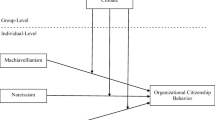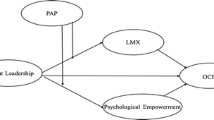Abstract
Purpose
The purpose of the study was to examine the joint moderating effects of employees’ conscientiousness and self-monitoring on the relationship between perceptions of organizational politics and organizational citizenship behaviors.
Design/Methodology/Approach
Data were collected from 139 subordinate–supervisor dyads through networks of business contacts and university alums of a university in the Midwest US.
Findings
We found a significant three-way interaction between perceived politics, conscientiousness, and self-monitoring in predicting citizenship behaviors. High self-monitoring alleviated the negative effects of politics perceptions on the OCB of highly conscientious employees. Conversely, perceived politics was negatively related to the OCB of employees who reported having either low self-monitoring and high conscientiousness or high self-monitoring and low conscientiousness.
Implications
Our results advance the theoretical understanding of the relationship between perceptions of organizational politics and citizenship behaviors by integrating the occupational stress perspective with social exchange theory within the socio-analytic framework. Evidence suggests that employees with certain combinations of traits (e.g., low self-monitoring and high conscientiousness or high self-monitoring and low conscientiousness) were particularly susceptible to the negative effects of perceived politics. This knowledge may help practitioners identify training needs or motivational strategies to help alleviate the negative effects of perceived politics on employee citizenship behaviors.
Originality/Value
This study is one of the few that took a holistic person-oriented approach when examining the moderating effects of individual traits on the linkages between perceived politics and citizenship behaviors. In addition, we utilized supervisor ratings of citizenship behaviors to overcome concerns associated with common source bias.


Similar content being viewed by others
Notes
We also examined the hypothesized effects with an overall OCB score, and the results were nearly identical to when OCBI and OCBO were treated as separate dimensions of OCB. The detailed results for the overall OCB analysis can be obtained from the first author.
References
Allen, T. D., & Rush, M. C. (1998). The effects of organizational citizenship behavior on performance judgments: A field study and a laboratory experiment. Journal of Applied Psychology, 83, 247–260.
Barrick, M. R., & Mount, M. K. (1991). The big five personality dimensions and job performance: A meta-analysis. Personnel Psychology, 44, 1–26.
Barrick, M. R., Stewart, G. L., & Piotrowski, M. (2002). Personality and job performance: Test of the mediating effects of motivation among sales representatives. Journal of Applied Psychology, 87, 43–51.
Blau, P. (1964). Exchange and power in social life. New York: Wiley.
Borman, W. C., & Motowidlo, S. J. (1993). Expanding the criterion domain to include elements of contextual performance. In N. Schmitt & W. C. Borman (Eds.), Personnel selection in organizations (pp. 71–98). San Francisco: Jossey-Bass.
Chang, C.-H., Rosen, C. C., & Levy, P. E. (2009). The relationship between perceptions of organizational politics and employee attitudes, strain, and behavior: A meta-analytic examination. Academy of Management Journal, 52, 779–801.
Cohen, J., Cohen, P., West, S., & Aiken, L. (2003). Applied multiple regression/correlation analysis for the behavioral sciences (3rd ed.). Hillsdale, NJ: Lawrence Erlbaum Associates.
Cropanzano, R., Howes, J. C., Grandey, A. A., & Toth, P. (1997). The relationship of organizational politics and support to work behaviors, attitudes, and stress. Journal of Organizational Behavior, 18, 159–180.
Dawson, J. F., & Richter, A. W. (2006). Probing three-way interactions in moderated multiple regression: Development and application of a slope difference test. Journal of Applied Psychology, 91, 917–926.
Day, D. V., & Schleicher, D. J. (2006). Self-monitoring at work: A motive-based perspective. Journal of Personality, 74, 685–713.
Day, D. V., Schleicher, D. J., Unckless, A. L., & Hiller, N. J. (2002). Self-monitoring personality at work: A meta-analytic investigation of construct validity. Journal of Applied Psychology, 87, 390–401.
Eatough, E. M., Chang, C.-H., Miloslavic, S., & Johnson, R. E. (2011). Relationships of role stressors with organizational citizenship behavior: A meta-analysis. Journal of Applied Psychology, 96, 619–632.
Fedor, D. B., & Maslyn, J. M. (2002). Politics and political behavior: Where else do we go from here? In F. Dansereau & F. J. Yammarino (Eds.), Research in multi-level issues (Vol. 1, pp. 287–294). Oxford: Elsevier/JAI Press.
Fedor, D., Maslyn, J., Farmer, S., & Bettenhausen, K. (2008). The contribution of positive politics to the prediction of employee reactions. Journal of Applied Social Psychology, 38, 76–96.
Ferris, G. R., Adams, G., Kolodinsky, R. W., Hochwarter, W. A., & Ammeter, A. P. (2002). Perceptions of organizational politics: Theory and research directions. In F. Dansereau & F. J. Yammarino (Eds.), Research in multi-level issues (pp. 179–254). Oxford: Elsevier/JAI Press.
Ferris, G. R., & Kacmar, K. M. (1992). Perceptions of organizational politics. Journal of Management, 18, 93–116.
Ferris, G. R., Perrewé, P. L., Anthony, W. P., & Gilmore, D. C. (2000). Political skill at work. Organizational Dynamics, 28, 25–37.
Ferris, G. R., Russ, G. S., & Fandt, P. M. (1989). Politics in organizations. In R. A. Giacalone & P. Rosenfeld (Eds.), Impression management in the organization (pp. 143–170). Hillsdale, NJ: Lawrence Erlbaum.
Ferris, G. R., Treadway, D. C., Kolodinsky, R. W., Hochwarter, W. A., Kacmar, C. J., Douglas, C., et al. (2005). Development and validation of political skill inventory. Journal of Management, 31, 126–152.
Ferris, G. R., Treadway, D. C., Perrewe, P. L., Brouer, R. L., Douglas, C., & Lux, S. (2007). Political skill in organizations. Journal of Management, 33, 290–320.
Goldberg, L. R. (1999). A broad-bandwidth, public domain, personality inventory measuring the lower-level facets of several five-factor models. In I. Mervielde, I. Deary, F. De Fruyt, & F. Ostendorf (Eds.), Personality psychology in Europe (Vol. 7, pp. 7–28). Tilburg: Tilburg University Press.
Grant, A. M. (2008). The significance of task significance: Job performance effects, relational mechanisms, and boundary conditions. Journal of Applied Psychology, 93, 108–124.
Halbesleben, J. R. B., & Bowler, W. M. (2007). Emotional exhaustion and job performance: The mediating role of motivation. Journal of Applied Psychology, 92, 93–106.
Hall, A. T., Hochwarter, W. A., Ferris, G. R., & Bowen, M. G. (2004). The dark side of politics in organizations. In R. W. Griffin & A. M. O’Leary-Kelly (Eds.), The dark side of organizational behavior (pp. 237–261). San Francisco: Jossey-Bass.
Harrell-Cook, G., Ferris, G. R., & Dulebohn, J. H. (1999). Political behaviors as moderators of the perceptions of organizational politics-work outcomes relationships. Journal of Organizational Behavior, 20, 1093–1105.
Hochwarter, W. A., Kolodinsky, R. W., Witt, L. A., Hall, A. T., Ferris, G. R., & Kacmar, M. K. (2006). Competing perspectives on the role of understanding in the politics perceptions–job performance relationship: A test of the ‘antidote’ versus ‘distraction’ hypotheses. In E. Vigoda-Gadot & A. Drory (Eds.), Handbook of organizational politics (pp. 271–285). Cheltenham: Edward Elgar Publishers.
Hochwarter, W. A., Witt, L. A., & Kacmar, L. M. (2000). Perceptions of organizational politics as a moderator of the relationship between conscientiousness and job performance. Journal of Applied Psychology, 85, 472–478.
Hoffman, B. J., Blair, C. A., Meriac, J. P., & Woehr, D. J. (2007). Expanding the criterion domain? A quantitative review of the OCB literature. Journal of Applied Psychology, 92, 555–566.
Hogan, R. (1991). Personality and personality measurement. In M. D. Dunnette & L. M. Hough (Eds.), Handbook of industrial and organizational psychology (2nd ed., Vol. 2, pp. 873–919). Palo Alto, CA: Consulting Psychologists.
Hogan, R., Hogan, J., & Roberts, B. W. (1996). Personality measurement and employment decisions. American Psychologist, 51, 469–477.
Hogan, R., & Shelton, D. (1998). A socio-analytic perspective on job performance. Human Performance, 11, 129–144.
Hough, L. M. (1992). The “big five” personality variables—construct confusion: Description versus prediction. Human Performance, 5, 139–155.
Ilies, R., Nahrgang, J. D., & Morgeson, F. P. (2007). Leader-member exchange and citizenship behavior: A meta-analysis. Journal of Applied Psychology, 92, 269–277.
Johnson, R. E., Rosen, C. C., & Djurdjevic, E. (2011). Assessing the impact of common method variance on higher-order multidimensional constructs. Journal of Applied Psychology, 96, 744–761.
Kacmar, K. M., & Carlson, D. S. (1997). Further validation of the Perceptions of Politics Scale (POPS): A multi-sample approach. Journal of Management, 23, 627–658.
Kamdar, D., & Van Dyne, L. (2007). The joint effects of personality and workplace social exchange relationships in predicting task performance and citizenship performance. Journal of Applied Psychology, 92, 1286–1298.
Lazarus, R. S., & Folkman, S. (1984). Stress, appraisal, and coping. New York: Springer.
Lennox, R. D., & Wolfe, R. N. (1984). Revision of the self-monitoring scale. Journal of Personality and Social Psychology, 46, 1349–1364.
Levy, P. E. (2010). Industrial-organizational psychology: Understanding the workplace (3rd ed.). New York: Worth Publishers.
Longenecker, C., Sims, H., & Gioia, D. (1987). Behind the mask: The politics of employee appraisal. Academy of Management Executive, 1, 183–193.
MaCrae, R. R., & Löckenhoff, C. E. (2010). Self-regulation and the five-factor model of personality traits. In R. H. Hoyle (Ed.), Handbook of personality and self-regulation (pp. 145–168). Malden, MA: Wiley-Blackwell.
Magnusson, D. (1995). Individual development: A holistic, integrated model. In P. Moen, G. L. Elder Jr, & K. Luscher (Eds.), Examining lives in context (pp. 19–60). Washington, DC: American Psychological Association.
Maslyn, J. M., & Fedor, D. B. (1998). Perceptions of politics: Does measuring different foci matter? Journal of Applied Psychology, 84, 645–653.
Mount, M. K., Barrick, M. R., & Strauss, J. P. (1999). The joint relationship of conscientiousness and ability with performance: Test of the interaction hypothesis. Journal of Management, 25, 707–721.
Organ, D. (1994). Personality and organizational citizenship behavior. Journal of Management, 20, 465–479.
Perrewé, P. L., Zellars, K. L., Ferris, G. R., Rossi, A. M., Kacmar, C. J., & Ralston, D. A. (2004). Neutralizing job stressors: Political skill as an antidote to the dysfunctional consequences of role conflict. Academy of Management Journal, 47, 141–152.
Podsakoff, P. M., MacKenzie, S. B., Lee, J.-Y., & Podsakoff, N. P. (2003). Common method biases in behavioral research: A critical review of the literature and recommended remedies. Journal of Applied Psychology, 88, 879–903.
Rosen, C. C., & Levy, P. E. Stresses, swaps, and skill: An investigation of the psychological dynamics that relate work politics to employee performance. Human Performance (in press).
Rosen, C. C., Chang, C. H., Johnson, R. E., & Levy, P. E. (2009a). Perceptions of the organizational context and psychological contract breach: Assessing competing perspectives. Organizational Behavior and Human Decision Processes, 108, 202–217.
Rosen, C. C., Chang, C.-H., & Levy, P. E. (2006a). Personality and politics perceptions: A new conceptualization and illustration using OCBs. In E. Vigoda-Gadot & A. Drory (Eds.), Handbook of organizational politics (pp. 29–52). Cheltenham: Edward Elgar Publishers.
Rosen, C. C., Harris, K. J., & Kacmar, K. M. (2009b). The emotional implications of perceived organizational politics: A process model. Human Relations, 62, 27–57.
Rosen, C. C., Levy, P. E., & Hall, R. J. (2006b). Placing perceptions of politics in the context of the feedback environment, employee attitudes, and job performance. Journal of Applied Psychology, 91, 211–220.
Rusbult, C., Campbell, M., & Price, M. (1990). Rational selective exploitation and distress: Employee reactions to performance-based and mobility-based reward allocations. Journal of Personality and Social Psychology, 59, 487–500.
Schuler, R. S. (1980). Definition and conceptualization of stress in organizations. Organizational Behavior and Human Performance, 25, 184–215.
Shore, L. M., Tetrick, L. E., Taylor, M. S., Coyle-Shapiro, J., Liden, R., McLean Parks, J., et al. (2004). The employee–organization relationship: A timely concept in a period of transition. In J. Martocchio (Ed.), Research in personnel and human resources management (Vol. 23, pp. 291–370). Greenwich, CT: JAI Press.
Spector, P. E. (2003). Individual differences in health and well-being in organizations. In D. A. Hofmann & L. E. Tetrick (Eds.), Health and safety in organizations: A multilevel perspective (pp. 29–55). San Francisco, CA: Jossey-Bass.
Spector, P. E. (2006). Method variance in organizational research: Truth or urban legend? Organizational Research Methods, 9, 221–232.
Sturman, M. C. (2003). Searching for the inverted u-shaped relationship between time and performance: Meta-analyses of the experience/performance, tenure/performance, and age/performance relationships. Journal of Management, 29, 609–640.
Valle, M., & Perrewé, P. L. (2000). Do politics perceptions relate to political behaviors? Tests of an implicit assumption and expanded model. Human Relations, 53, 359–386.
Van Scotter, J., Motowidlo, S. J., & Cross, T. C. (2000). Effects of task performance and contextual performance on systemic rewards. Journal of Applied Psychology, 85, 526–535.
Vroom, V. H. (1964). Work and motivation. New York: Wiley.
Wallace, J. C., & Chen, G. (2005). Development and validation of a work-specific measure of cognitive failure: Implications for occupational safety. Journal of Occupational and Organizational Psychology, 78, 615–632.
Weick, K. E. (1995). Sensemaking in organizations. Thousand Oaks, CA: SAGE.
Williams, L. J., & Anderson, S. E. (1991). Job satisfaction and organizational commitment as predictors of organizational citizenship and in-role behaviors. Journal of Management, 17, 601–617.
Witt, L. A., Burke, L. A., Barrick, M. R., & Mount, M. K. (2002a). The interactive effects of conscientiousness and agreeableness on job performance. Journal of Applied Psychology, 87, 164–169.
Witt, L. A., & Ferris, G. R. (2003). Social skill as moderator of the conscientiousness–performance relationship: Convergent results across four studies. Journal of Applied Psychology, 88, 809–820.
Witt, L. A., Kacmar, K. M., Carlson, D. S., & Zivnuska, S. (2002b). Interactive effects of personality and organizational politics on contextual performance. Journal of Organizational Behavior, 23, 911–926.
Acknowledgment
An earlier version of the paper was presented at the 2008 Southern Management Association Meeting.
Author information
Authors and Affiliations
Corresponding author
Rights and permissions
About this article
Cite this article
Chang, CH., Rosen, C.C., Siemieniec, G.M. et al. Perceptions of Organizational Politics and Employee Citizenship Behaviors: Conscientiousness and Self-monitoring as Moderators. J Bus Psychol 27, 395–406 (2012). https://doi.org/10.1007/s10869-012-9257-6
Published:
Issue Date:
DOI: https://doi.org/10.1007/s10869-012-9257-6




